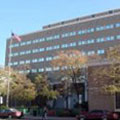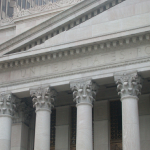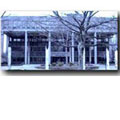860 236-9350 / Text 860 977-0660
690 Flatbush Avenue, West Hartford, CT 06110-1308
Text 860 977-0660
860 236-9350 / Text 860 977-0660
690 Flatbush Avenue, West Hartford, CT 06110-1308
Text 860 977-0660
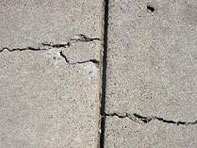 For 30 years we have been helping people who suffer personal injury after falling on unsafe property. Premises liability is the legal term for these types of cases.
For 30 years we have been helping people who suffer personal injury after falling on unsafe property. Premises liability is the legal term for these types of cases.
Fall down accidents usually involve falls on uncleared ice and snow, on broken or uneven sidewalks, on dangerous stairways, and on slippery floors in stores and supermarkets. If you have been hurt on someone's property, call us at 860 236-9350 for a free consultation to know your legal rights and whether you have a case.
The owner or person who controls a property has a duty to protect people who are on the property. What must be done to make the property safe depends on who it is that is on the property. The law allows the executor or administrator of a estate to bring a negligence claim against the person or persons legally at fault for causing a person’s death. (If the deceased person left a Last Will, the executor is the person named in the Will to handle the deceased person’s estate.) We only charge a fee if we win or settle the case.
An invitee is someone who is invited to go on the premises (the legal term for property). When you go shopping, visit a movie theater or eat at a restaurant, you are an invitee. The possesor of the premises (the person or company that controls the property) must inspect the property to make sure it is safe, must keep the property in good condition so that it is not dangerous, and must warn you about dangers that you would not be expected to discover on your own.
If you rent, you are the landlord's invitee when you are outside your apartment in places such as the hallways, stairs, driveway, parking lot, walkways and laundry room.
A licensee is someone who has not been invited onto property but has permission to go there. Your cousin goes with you to pick up your daughter from a sleepover at her friend's house. The friend's father has been installing a porch railing that is not yet nailed. Your cousin leans on the railing and falls. The law of premises liability most likely will consider your cousin to be a licensee. The homeowner had the duty to warn licensees — your cousin in this example — about the railing because he should have known that people would be coming and it was not obvious that the railing was loose.
A trespasser is someone who does not have the right to go on a property. You are walking your dog and trespass across a neighbor's yard to get to a dog park. The neighbor is tired of people cutting across his lawn so he puts a strip of wood with nails sticking out of it in the grass. You step on the wood and get hurt. You can sue the neighbor because the strip of wood is an artificial condition created by the neighbor that is likely to cause serious injury and not likely to be discovered.
Any person injured by a fall must show that the person in control of the property knew that the defective condition existed but failed to remedy the condition or must show that the condition existed for so long that is should have been discovered by the person responsible for the property.
 In Connecticut, a property owner has a reasonable amount of time after a snowstorm ends to clear snow and ice and to spread sand or salt on sidewalks, walkways, and parking lots. Therefore, if someone falls when it is snowing or sleeting, or soon afterward, the property owner will not be found liable. There may be a successful case, however, if it can be shown that the person fell on pre-existing ice. Proving these kinds of cases at trial requires skillful use of weather reports and expert witnesses. We have been able to obtain compensation for clients in these kinds of cases, including settlements for a client who fell during an active snowstorm (six-figures) and for another client who fell with two feet of newly fallen snow on the ground.
In Connecticut, a property owner has a reasonable amount of time after a snowstorm ends to clear snow and ice and to spread sand or salt on sidewalks, walkways, and parking lots. Therefore, if someone falls when it is snowing or sleeting, or soon afterward, the property owner will not be found liable. There may be a successful case, however, if it can be shown that the person fell on pre-existing ice. Proving these kinds of cases at trial requires skillful use of weather reports and expert witnesses. We have been able to obtain compensation for clients in these kinds of cases, including settlements for a client who fell during an active snowstorm (six-figures) and for another client who fell with two feet of newly fallen snow on the ground.
Liability issues also arise when there is a freeze, melt, freeze situation such as when water flows from a snow pile or gutter and freezes overnight. Weather and engineering reports are required to show negligence in these situations.
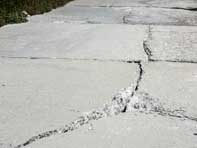 Cases for compensation for injuries from a fall on a sidewalk often involve claims against a town or city. These kinds of cases, known as municipal liability, are more difficult than ordinary negligence cases against private individuals or businesses because it is necessary to show that the injured person had no fault in causing the accident. Ordinarily, under Connecticut's rule of comparative negligence, as long as the injured person is found to be no more than 50% at fault for the accident, the person will get paid for the accident although the amount will be reduced by the amount the person was found to be at fault. For example, a person driving over the speed limit who gets hit by car coming out from a stop sign is found to be 40% at fault. If the jury awards the person $100,000, the court will reduce the award by 40% and the person will receive $60,000. In contrast, a person suing a town for negligence who is found to be just 1% at fault for the accident will not receive anything.
Cases for compensation for injuries from a fall on a sidewalk often involve claims against a town or city. These kinds of cases, known as municipal liability, are more difficult than ordinary negligence cases against private individuals or businesses because it is necessary to show that the injured person had no fault in causing the accident. Ordinarily, under Connecticut's rule of comparative negligence, as long as the injured person is found to be no more than 50% at fault for the accident, the person will get paid for the accident although the amount will be reduced by the amount the person was found to be at fault. For example, a person driving over the speed limit who gets hit by car coming out from a stop sign is found to be 40% at fault. If the jury awards the person $100,000, the court will reduce the award by 40% and the person will receive $60,000. In contrast, a person suing a town for negligence who is found to be just 1% at fault for the accident will not receive anything.
Municipal liability cases also require that notice containing specific information about the accident be sent to specific government officials within a relatively short period of time after the accident. The bottom line: if you are injured from falling on a sidewalk, contact an experienced personal injury trial lawyer as soon as possible to preserve your rights and get the compensation you deserve for your injuries.
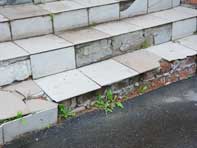 Stairways must meet building code requirements in regard to lighting, height and width of steps, pitch, and placement of railings. Stairway liability cases usually involve broken, loose or worn steps; dark or unlit stairwells; missing or broken handrails; and littered or obstructed stairs. Engineering reports and testimony may be necessary to establish liability. Injuries from falling on stairs are often severe. Broken bones and head injuries commonly occur, along with knee, shoulder and ankle sprains and dislocations.
Stairways must meet building code requirements in regard to lighting, height and width of steps, pitch, and placement of railings. Stairway liability cases usually involve broken, loose or worn steps; dark or unlit stairwells; missing or broken handrails; and littered or obstructed stairs. Engineering reports and testimony may be necessary to establish liability. Injuries from falling on stairs are often severe. Broken bones and head injuries commonly occur, along with knee, shoulder and ankle sprains and dislocations.
 Slip and fall accidents are common in supermarkets and restaurants due to the likelihood of slippery substances such as food and liquids landing on the floor. The key issue in these cases is usually proving how long the slippery item was on the floor. Security camera footage can be key to proving a case at trial but may not always be available. Falls in department and hardware stores often result from improperly located items and signs. Merchandise and displays may be placed in such a manner that they become tripping hazards. Customers going through bins may let items drop to the floor and the store may become liable if it fails to have procedures in place to regularly inspect and clear the aisles.
Slip and fall accidents are common in supermarkets and restaurants due to the likelihood of slippery substances such as food and liquids landing on the floor. The key issue in these cases is usually proving how long the slippery item was on the floor. Security camera footage can be key to proving a case at trial but may not always be available. Falls in department and hardware stores often result from improperly located items and signs. Merchandise and displays may be placed in such a manner that they become tripping hazards. Customers going through bins may let items drop to the floor and the store may become liable if it fails to have procedures in place to regularly inspect and clear the aisles.






Si ha sido lesionado por una caída debido a hielo u otro defecto, llámenos para hablar con un abogado que hable su idioma. No hay costo a menos que obtengamos dinero para usted.
Se você foi ferido por uma queda devido a gelo ou outro defeito, ligue-nos para falar com o advogado que fala a sua língua. Não há custo a menos que obtenhamos dinheiro para você.
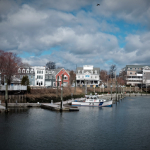
Ansonia, Milford, Orange, Oxford, Shelton, Southbury, West Haven

Bethel, Brookfield, Danbury, New Milford, Newtown, Ridgefield, Sherman
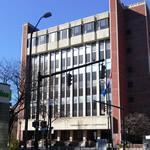
Bridgeport, Easton, Fairfield, Monroe, Stratford, Trumbull
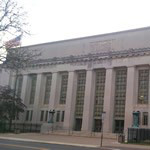
Avon, Bloomfield, Enfield, East Hartford, Farmington, Glastonbury, Hartford, Manchester, Newington, Rocky Hill, Simsbury, South Windsor, West Hartford
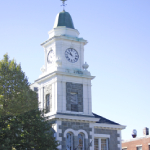
Bethlehem, Canaan, Cornwall, Goshen, Harwinton, Kent, Litchfield, New Hartford, New Milford, Norfolk, Thomaston, Torrington, Washington, Winchester, Winsted, Woodbury
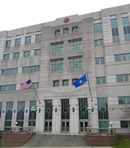
Chester, Clinton, Cromwell, Deep River, Durham, East Haddam, East Hampton, Essex, Haddam, Killingworth, Middlefield, Middletown, Portland, Old Saybrook, Westbrook
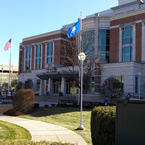
Avon, Berlin, Bristol, Burlington, Farmington, New Britain, Newington, Plainville, Rocky Hill, Simsbury, Southington, Wethersfield
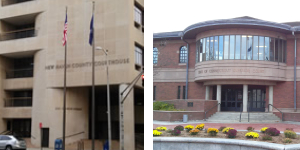
Branford, Cheshire, East Haven, Guilford, Hamden, Milford, New Haven, North Haven, Meriden, Wallingford, West Haven
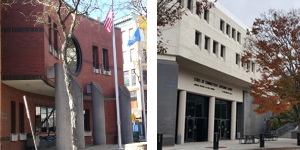
Colchester, East Lyme, Groton, Ledyard, Lyme, Montville, New London, Norwich, Old Lyme, Salem, Stonington, Waterford
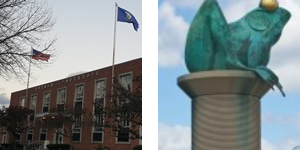
Ashford, Brooklyn, Killingly, Ledyard, Plainfield, Pomfret, Putnam, Willimantic, Windham, Woodstock
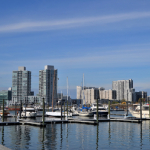
Darien, Greenwich, New Canaan, Norwalk, Stamford, Weston, Westport, Wilton
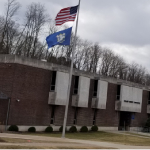
Andover, Bolton, Columbia, Coventry, Ellington, Enfield, Hebron, Manchester, Mansfield, Rockville, Somers, Stafford Springs, Storrs, Tolland, Vernon
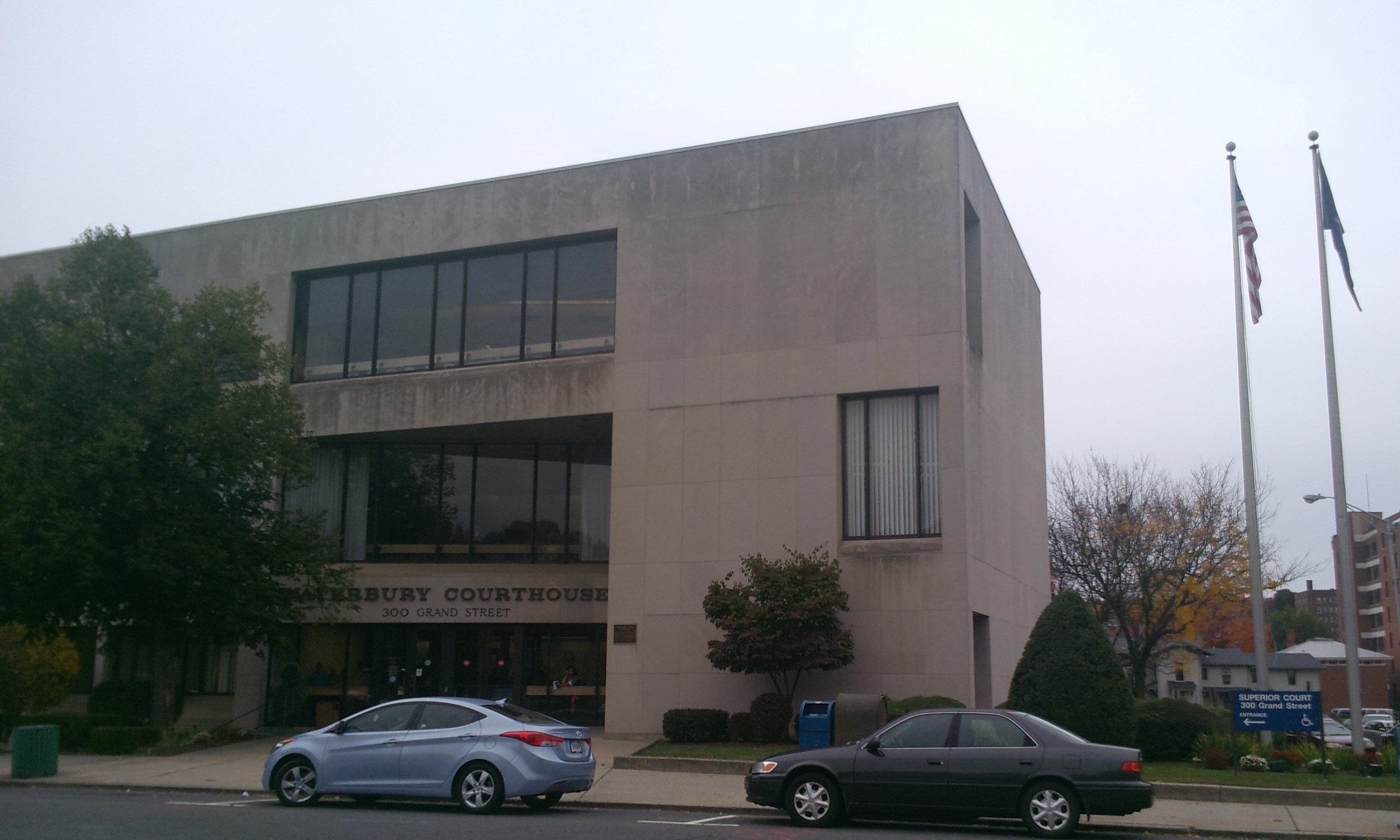
Middlebury, Naugatuck, Prospect, Southbury, Waterbury, Watertown, Wolcott, Woodbury
